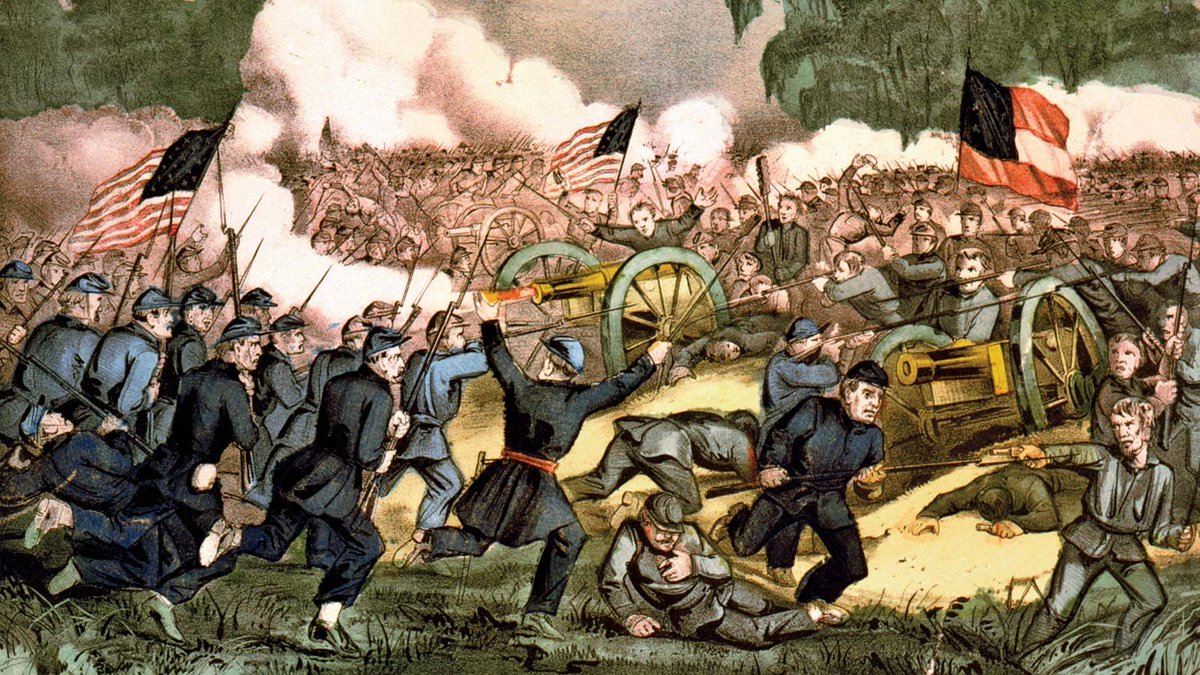This 🧵is motivated by the #January6thAnniversary-inspired takes on whether the US is on the verge of ANOTHER civil war.
https://twitter.com/zackbeauchamp/status/1478021859677511680
The short answer is "NO".
The longer answer is "No, but the potential for lower-level political violence is real."
The longer answer is "No, but the potential for lower-level political violence is real."
https://twitter.com/pstanpolitics/status/1478140553497821188
The US Civil War was a BIG war. How big? Larger than any European war (such as the Crimean War) fought between the Napoleonic wars and World War I. 

It was so large that there's still debate about exactly how many hundreds of thousands were killed.
npr.org/2012/05/29/153…
npr.org/2012/05/29/153…
Knowing why it happened and why it was so large helps us understand why it's VERY unlikely to happen again.
Why it happened is captured in a word: Slavery.
In more words: the war was how the Northern states prevented the Southern states from leaving the United States so that they could preserve slavery.
In more words: the war was how the Northern states prevented the Southern states from leaving the United States so that they could preserve slavery.

More precisely, slavery is why the secession crisis of 1860-61 took place.
As American Civil War historians will point out, one must separate the Southern decision to secede and the Northern response to that decision.
link.springer.com/chapter/10.100…
As American Civil War historians will point out, one must separate the Southern decision to secede and the Northern response to that decision.
link.springer.com/chapter/10.100…
When Abraham Lincoln won the Presidency in 1860, the Southern states feared that he would seek to end slavery as a legal institution in the United States.
After all, the Republican party platform referred to the slave trade as "a crime against humanity"
loc.gov/resource/lprbs…
After all, the Republican party platform referred to the slave trade as "a crime against humanity"
loc.gov/resource/lprbs…
So some of the Southern States, starting with South Carolina in December of 1860, declared their intent to leave the Union. 

As their declaration of Secession makes clear, the decision was indeed motivated by the need to preserve slavery.
Sure "states rights" are mentioned. But the right to do what? Hold slaves.
Source: avalon.law.yale.edu/19th_century/c…
Sure "states rights" are mentioned. But the right to do what? Hold slaves.
Source: avalon.law.yale.edu/19th_century/c…

Officials in South Carolina (and other states, including Northern ones) thought they could leave the Union because, from their perspective, the Constitution was more "international treaty" than "founding document"
academic.oup.com/past/article/2…
academic.oup.com/past/article/2…
Understanding that slavery was the driving issue is absolutely critical for understanding why this "crisis" and "dispute" became a "war".
That's because, from the Southern states perspective, property and land were at stake.
As I shared recently in @WarOnTheRocks, land is KEY to explaining many/most wars.
warontherocks.com/2021/12/this-l…
As I shared recently in @WarOnTheRocks, land is KEY to explaining many/most wars.
warontherocks.com/2021/12/this-l…
The need to protect land is a key reason why those who actually fought for the Southern Confederacy were largely slave holders (not everyone in the South owned slaves).
cambridge.org/core/journals/…
cambridge.org/core/journals/…
This "territoriality" mindset influenced the decision making in the North as well. From the North's perspective, you're talking about losing a huge chunk of your land. 

From Lincoln's perspective, the issue wasn't about slavery per se, but about preserving the Union.
As Lincoln remarked in August 1862, "If I could save the Union without freeing any slaves, I would do it."
abrahamlincolnonline.org/lincoln/speech…
As Lincoln remarked in August 1862, "If I could save the Union without freeing any slaves, I would do it."
abrahamlincolnonline.org/lincoln/speech…
Lincoln's views on slavery's role in the war would eventually change. I discussed that in a 🧵on #Juneteenth last year
https://twitter.com/ProfPaulPoast/status/1406213940825235462
Since you are dealing with large segments of land, it's really not surprising that both sides developed large, standing armies (to either take or hold the land)
amazon.com/Yankee-Leviath…
amazon.com/Yankee-Leviath…
In sum, the secession crisis of 1860-61 became a "war" in large part because the dispute was over land (not over election outcomes, economic anxiety itself, or ideology). The North and South were fighting over who controlled the land and how it could be used.
[END]
[END]
• • •
Missing some Tweet in this thread? You can try to
force a refresh















